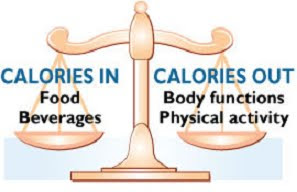If you are trying to establish your caloric needs, you will need to determine your body’s metabolic rate – or total energy expenditure. There are three components that make up your total energy expenditure: Basal Metabolic Rate (BMR), Thermic Effect of Food (TEF), and Energy Expenditure from Activity.
Basal metabolic rate is the number of calories your body burns at rest. This number represents about 50-80% of your total energy used. BMR refers to the amount of energy your body needs to sustain itself. It can be roughly calculated by multiplying your body weight in pounds by 10 calories. So, as an example, a person weighing 135 would have a BMR of approximately 1,350 calories.
Thermic effect of food is the energy your body uses to eat, digest and metabolize the food you eat. Regardless of what you thought before, eating actually raises your metabolism. After each meal, the metabolic rise occurs soon after you start eating and peaks two to three hours later. This is why some experts recommend eating smaller meals more frequently to keep your metabolism stoked. Some of the foods you eat speed up your metabolism more than other foods. Proteins tend to have a much higher TEF than other types of foods. The thermic effect of food is roughly estimated to be about 10% of total caloric intake. So, if the same person in the above example is eating a 2,000 calorie a day diet, the approximate TEF is 200 calories.
Energy used during physical activity is the number of calories your body burns during physical activity or exercise. This number includes any activity above and beyond sitting or resting. Of the three components that make up your body’s metabolic rate, this is the only number we have direct control over – we can manipulate it by being more physically active. So, the same 135 pound person would need to expend 450 calories (2,000 – 1,350 – 200 = 450) to be in balance or maintenance. In order to lose weight, the person in the example would either need to eat less or exercise more.
Do you know how many calories you should be eating? Are you eating to maintain, gain or lose weight?



